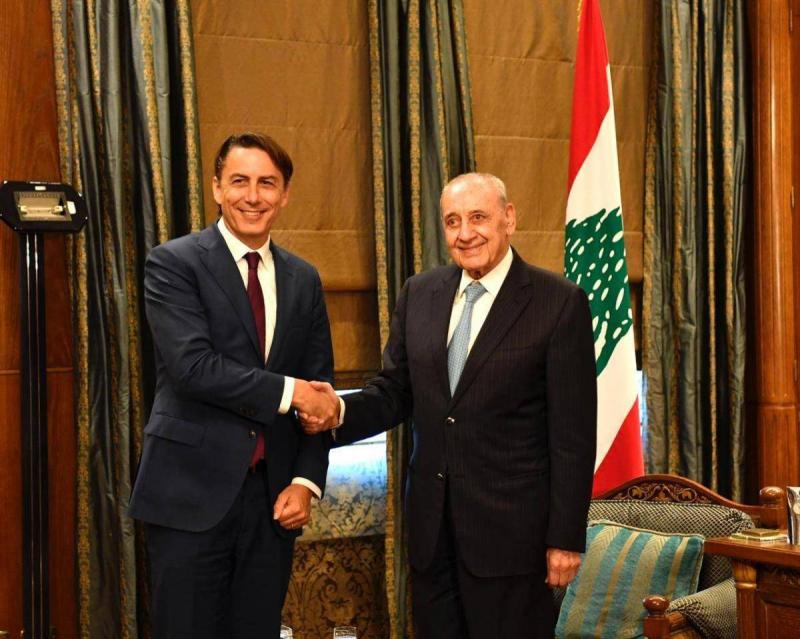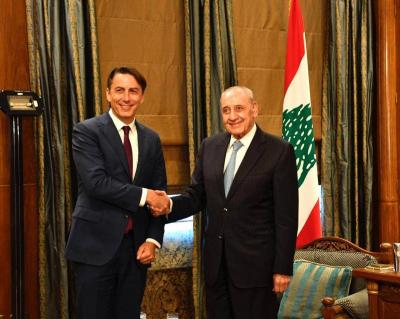Political sources following the atmosphere surrounding the recent negotiations between Speaker of the House Nabih Berri, on behalf of Hezbollah, and U.S. mediator Amos Hochstein revealed that reducing tension between Hezbollah and Israel along the southern front was at the top of their agenda. This was aimed at preventing a military confrontation from escalating into a wider war. The sources told "Asharq Al-Awsat" that Hochstein and Berri discussed a series of ideas, the main one being adherence to the rules of engagement that were in place before Hezbollah's involvement in supporting Hamas on October 8, reverting back to the situation as it was on October 7.
The political sources noted that merely returning to the situation prior to October 7 would, in Hochstein's view, lead to the return of displaced persons on both sides of the Lebanese-Israeli border. They emphasized that all ideas discussed between Hochstein and Berri remained under the necessity of adhering to the rules of engagement. Among these ideas was the commitment by both Hezbollah and Israel to refrain from using any types of drones and to avoid reciprocal shelling deep into each other's territory. Berri confirmed to Hochstein that Israel was the aggressor and had not ceased its violations of Lebanese airspace, land, and maritime boundaries; Israel continues to occupy several locations along the intersecting points between the two countries that fall under Lebanese sovereignty, including the Shebaa Farms and Kfarshouba Hills, and has refused to implement Resolution 1701, which Lebanon is committed to.
The sources confirmed that discussions included both parties refraining from reciprocal shelling and Israel ceasing the use of phosphorus bombs, which have resulted in the burning of crops and fruit trees, particularly in the villages and towns along the front lines. They added that merely adhering to these ideas would inevitably help stabilize the military confrontation and prevent the situation from deteriorating into a wider war due to any party misjudging the course of events. The sources conveyed that, according to what Berri told Hochstein, Hezbollah is practicing utmost restraint and does not want to escalate the war, but is prepared for it if Israel chooses to expand.
Hochstein conveyed the necessity of reducing tensions and preventing them from spiraling out of control until a ceasefire can be reached in Gaza, which should coincide with a calming of the situation in the south. This requires preparing the atmosphere for a prior agreement between Lebanon and Israel, to be implemented as soon as the truce in Gaza takes effect. It was confirmed that Hochstein reiterated the United States' rejection of any expansion of the war and provision of political cover for Israel to prevent the conflict from spreading regionally with Iran entering the confrontation.
The sources clarified that all rumors about the failure of the negotiations are unfounded, indicating that Hochstein and Berri are maintaining communication. Hochstein is expected to inform Berri of the results of his meeting with Israeli Prime Minister Benjamin Netanyahu during his second visit to Tel Aviv after returning from Beirut, which included talks with Caretaker Prime Minister Najib Mikati, Foreign Minister Abdullah Bouhabib, Army Commander General Joseph Aoun, and Intelligence Director Brigadier General Toni Khoury, in addition to Berri representing Hezbollah, given his responsibility in calming the situation on the southern front.
They indicated that Berri would build on this discussion with the party in light of Netanyahu's response to the ideas proposed by Hochstein to reduce tension, although Hochstein allegedly advised resuming negotiations between Lebanon and Israel to reach a prior agreement, which seems contingent upon the developments in Gaza. He hinted that Israel still requires a timeframe of about three to four weeks to gain control over Rafah, according to "Asharq Al-Awsat."




